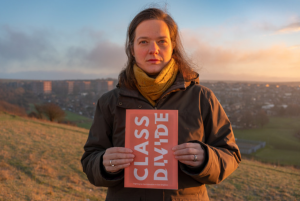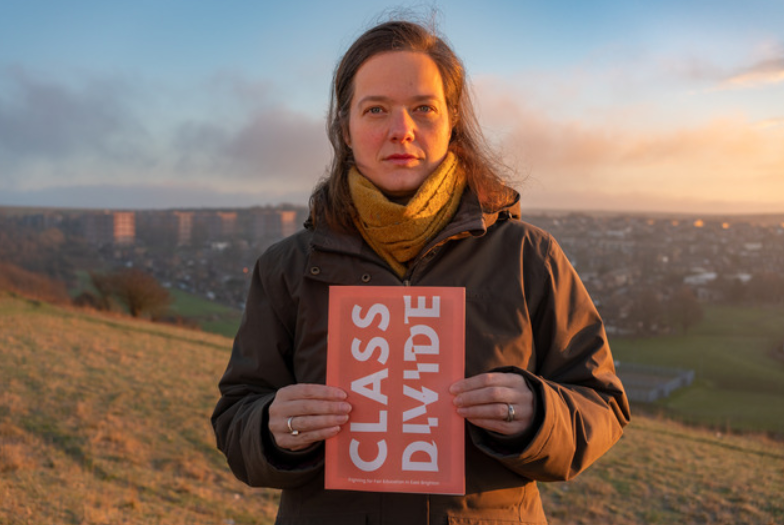Hundreds of the poorest families in Brighton have splashed out almost £2 million in bus fares on journeys to and from school since their local secondary was closed, according to campaigners.
Now, they are calling for free transport to and from secondary school for all pupils living in the East Brighton communities of Whitehawk, Manor Farm and the Bristol Estate from September
They also want “suitable transport for students who attend after-school activities at Longhill High School and a direct bus service from our neighbourhood to the Brighton Aldridge Community Academy” (BACA).
More than 400 people have signed a petition which is due to be presented to Brighton and Hove City Council at a meeting on Thursday 15 July.
If more than 1,250 people sign the petition, it may then also be debated at the meeting of the full council.
The petition was started Carlie Goldsmith as part of the Class Divide campaign to give young people from deprived areas of Brighton and Hove a better chance in life.
Dr Goldsmith organised a meeting with parents to help improve education outcomes for Whitehawk children and said that transport costs had been the “most pressing issue”.
She found that many parents found the council’s free school travel policy confusing, with some parents paying unnecessarily to send their children to Longhill.
Costs started mounting for families after the secondary school in Wilson Avenue, Brighton, closed in 2005.
It was called Stanley Deason Secondary School when it opened in 1976, after a long-serving former councillor.
The school was rebranded as Marina High in September 1997 and again as East Brighton College of Media Arts – or COMART – in September 1999. It closed in the summer of 2005.
The closure means that, from the age of 11, children from East Brighton have tended to go to Longhill, in Rottingdean, which the catchment area school, or to BACA, in Falmer.
Dr Goldsmith said that children attending schools outside the catchment area were eligible for free transport only if they had special educational needs or were eligible for free school meals.
As a result, she said, the prospect of spending about £400 a year on getting to and from school left most families with no real choice of secondary school.

The petition said: “Travel to school costs a family with two children approximately £875.50 per year.
“We estimate that since 2005 when our local school was closed, our families have paid just under £2 million in today’s money to Brighton and Hove Buses for school bus travel.
“This is despite the fact that it was not the decision of local residents to close the school and that Whitehawk, Manor Farm and Bristol Estate are in the top 10 per cent most economically deprived neighbourhoods in England and many of our families live on very low incomes.”
Dr Goldsmith said: “What we’re asking for is a blanket policy. If your child is going to secondary school, they should be entitled to free school travel because there isn’t a local school.
“Then parents don’t have to worry about the cost of travel for their children which means when they’re picking a secondary school – there are other factors – but the cost of transport is not one of them.
“For our families, the cost of transport is a huge barrier in the decisions they’re making around their children’s education.
“For me, it seems fundamentally not right when you might have a family with a combined income of £100,000 who don’t have to pay for travel because they live within in walking distance of a secondary school when a family in Whitehawk earning £20,000 have to pay for transport because they have no other option.”
…
One parent, Lisa Pettitt, a mother of five, has an 11-year-old daughter who goes to BACA. They spend £10.50 a week on bus travel after she was refused a free bus pass.
It was only after joining the parents’ meeting organised by Dr Goldsmith that Ms Pettitt learnt that her daughter was entitled to a free pass because she received free school meals.
Ms Pettitt, who works in the tea rooms in Stanmer Park, drops her off at BACA before starting work but, after school, her 11-year-old takes two buses to get home.
The prospect of an early start then more than an hour on two buses followed by six hours at school meant that Ms Pettitt decided to take her daughter in by car.
She chose BACA, she said, because most of her daughter’s friends were going there. She said: “You should not have to choose the school your child goes to because it’s the closest.
“You should choose the school because you want the best education for your child.”
…
Michelle McCann, who also lives in Whitehawk, was shocked at the cost of a bus pass after opting for BACA, where most of her 11-year-old daughter’s friends go. It costs £335 for a year or £33 for 28 days.
She said: “I’m incredibly lucky that we can budget for the monthly cost. However, many parents we know will not be able to afford these additional costs, be it on a low income or on benefits or a variety of other reasons.
“The cost of the year pass, for example, is the same as our monthly food budget.”
Mrs McCann was also concerned about how the cost of transport, combined with spending £200 on a mix of branded and unbranded school uniform, was a big problem for families even though the council had looked at “poverty-proofing” education.
The council said: “All secondary pupils who live more than three miles from their catchment area school are eligible for a bus pass.
“There are a number of pupils in the Whitehawk area whose catchment school is Longhill who benefit from this.
“Pupils who go to a school outside their catchment area are not eligible for a bus pass on the grounds of home to school distance.
“The rules on free bus passes for pupils who are eligible for free school meals are slightly different.
“They are eligible for a bus pass to one of the three closest schools to them as well as their catchment school.
“In the Whitehawk area these schools are Cardinal Newman, Dorothy Stringer and Varndean as well as Longhill.”
To sign the petition, click here.









Wasn’t it a Labour Council and a Labour Government which closed COMART? The immediate fall-out was the catchment controversy. Brighton College and other private schools in the area were the biggest beneficiaries. Now we learn it’s also meant, effectively, a poor tax ever since on those who lived nearest COMART. Education, education, education, ha ha ha!
It looks like, in truth, Labour hates the working class (and the under-class) even more than the Greens and the Tories.